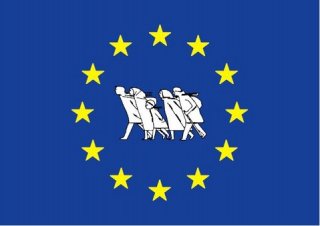I’ve Been Working on the Railroad! Finding Your Ancestor in Railway Company Records
Millions of Americans have been involved in the construction and operation of the massive rail system that transverses the country; from the time construction began in the early nineteenth century to present day. The period from 1900-1945 was known as “The Golden Age of Railroads”, and during that time railroads were the premier mode of long-distance transportation. By the early 20th century, it is said that 5% of all Americans were employed by the railway industry in some capacity. It is no wonder then that railway records can reveal valuable information about our ancestors.
I began researching one of my own ancestors in the area in which they lived at the time of their employment. I found out what lines operated in the area at that time by consulting some historical maps and local histories. From that point I began digging through the histories of specific railway companies to find out if they were still in operation, who the present owners were, and then what records they had for the time period of my ancestor and where I could find them. I discovered that the individual records of many railway workers have not survived, but the historical collections of many railway companies still retain some. There are also various archives scattered across the country that contain databases of various sizes, including: railway museums, university libraries, and state archives.
I didn’t find much information on my ancestor unfortunately, and am now looking in a different direction. I did come across many resources that could lead you to yours however, and so I thought I’d share them here. They are extremely interesting records, especially if you are a history buff, and you may even find your ancestor in them. What’s more, they are free genealogy resources, so why not take advantage of them!
This section of the National Archives provides excellent advice on researching railway records in the National Archives, including annual reports of railroad companies, railroad valuation records, patent application files, railroad accident reports, and other railroad-related records.
United States Railroad Retirement Board
The United States Railroad Retirement Board oversees a Federal retirement benefits schedule for the nation’s railroad workers which is essentially the Social Security Administration for railway employees. They can provide copies of records for deceased persons who were employed in the railroad industry from 1936 to present.
Railroads in North America -Their Evolution and Family Structure by Milton C. Hallberg
The database available through Milton Hallberg’s web page is designed as a compilation of all existing mainline, switching, and terminal railroads, as well as of all operational railways that have existed in the United States and Canada since the Granite Railway – the first railroad – was authorized in Massachusetts in 1826. Presently the database includes over 6,900 railroads and is specifically constructed so that genealogists can generate informative railroad family histories.
Erie Railroad Internet Employee Archives
This is an excellent online resource for anyone researching ancestors who were employed by the Erie Railroad. The Erie Railroad linked Chicago with Jersey City and New York. The Archive contains employee rosters, historical news articles, photographs, reports and other related data. The information dates back to circa 1851, and additional information has been submitted by former Erie Railroad workers, the Salamanca, NY Railroad Museum and fellow researchers.
Department of Transportation Historical Railroad Investigation Reports
This is part of the Online Special Digital Collections of the U.S. Department of Transportation and includes detailed transcriptions of investigations into railroad accidents that occurred between 1911 and 1994. It can be viewed as both text and PDF.
These are some of the best free genealogy resources for tracing ancestors who worked for the railroad companies. Railway records are just one of the secondary resources that can lead us to primary records of our ancestors. They are well worth looking through, especially if your ancestor lived in areas where railways were built during the nineteenth century.

